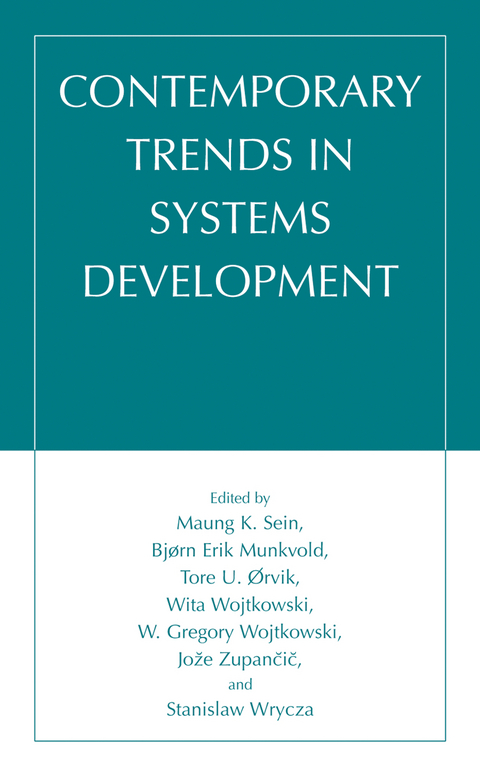
Contemporary Trends in Systems Development
Springer-Verlag New York Inc.
978-1-4613-5506-9 (ISBN)
Section 1: Perspectives on information systems developement.- 1. The Machine Is Not the Woman: Cyberfeminism and the Techno- Determinism of Information Systems.- 2. To Err Is Human: Implications for Information Systems Development.- 3. CRISP: The Campaign for Real Information Systems Production.- 4. Methodological Rigour and Methodology Relevance in IS Development.- Section 2: Information systems development methods.- 5. The Impact of Reference Modeling in MRPII/ERP Systems on Business Process Reengineering.- 6. A Maturity Framework for the Enterprise Modeling and Engineering Process.- 7. Development Methods for Knowledge Intensive Applications.- 8. Framework Oriented Software Development and Its Challenges: Commercial Software Solutions Provider Perspective.- 9. Are Use Cases Necessarily the Best Start of an OO System Development Process?.- Section 3: Information systems development tools, techniques and technologies.- 10. Using Hierarchies to Adapt Domain Analysis to Software Development.- 11. A Mobility Prediction Handover Algorithm for Quality of Service Improvement in Wireless ATM.- 12. FTI Algorithm for Component Interface Meta Modeling of the TMN Agents.- 13. XML: A Challenge for Databases?.- 14. Process Diagram Technique for Business Processes Modeling.- 15. Artificial Neural Networks in Predicting a Dichotomous Level of Financial Distress for Uneven Training and Testing Samples.- Section 4: Management of information systems and systems development.- 16. Managing Software Development within a Virtual Project Environment.- 17. Managerial Enterprise Structural Stakeholders (MESS) Model— Modelling the Influence of Organisational Politics and Structure Upon Cost of Systems Development.- 18. Development Recommendations for Knowledge Management/ OrganizationalMemory Systems.- 19. An Integrated Object & Fuzzy Cognitive Maps Approach to Business Process Management.- 20. An Empirical Assessment of IT Disaster Probabilities.- 21. Knowledge Management: Trusting Knowledge Workers.- 22. Information Systems Audit for Investment Decision.- Section 5: Information systems application areas.- 23. Implementation of an Integrated Software Package.- 24. Matchmaking Mechanisms for Agent-Mediated Electronic Markets.- 25. Implementing Enterprise Resource Planning Systems: Implications for Financial Specialists.- 26. A Model for Organisational Integration of Meeting Outcomes.- 27. Decision Support Systems Implementation Research: Review of the Current State and Future Directions.- 28. WWW Workflows Based on Petri Nets.- 29. Information Technology in the Marketing Mix of a Modern Business.- 30. Manningham On-Line—Using Global Technologies for Building Local Electronic Commerce Business.- Section 6: Information systems education and learning.- 31. Maintaining Software May Help an Organization Learn: Applying Organizational Learning to Software Enhancement.- 32. Object Based Learning Systems (OBL): A Virtual Context for Embedding Artificial Intelligence in Tutorial Software.- 33. Teaching XML in a Business School: Lessons Learned from the Agder Experience.- 34. Projects as Learning Environments: A Case Study in IS Education.
| Zusatzinfo | XIII, 433 p. |
|---|---|
| Verlagsort | New York, NY |
| Sprache | englisch |
| Maße | 155 x 235 mm |
| Themenwelt | Mathematik / Informatik ► Informatik ► Datenbanken |
| Informatik ► Software Entwicklung ► User Interfaces (HCI) | |
| Informatik ► Theorie / Studium ► Algorithmen | |
| Mathematik / Informatik ► Mathematik ► Finanz- / Wirtschaftsmathematik | |
| ISBN-10 | 1-4613-5506-0 / 1461355060 |
| ISBN-13 | 978-1-4613-5506-9 / 9781461355069 |
| Zustand | Neuware |
| Haben Sie eine Frage zum Produkt? |
aus dem Bereich


